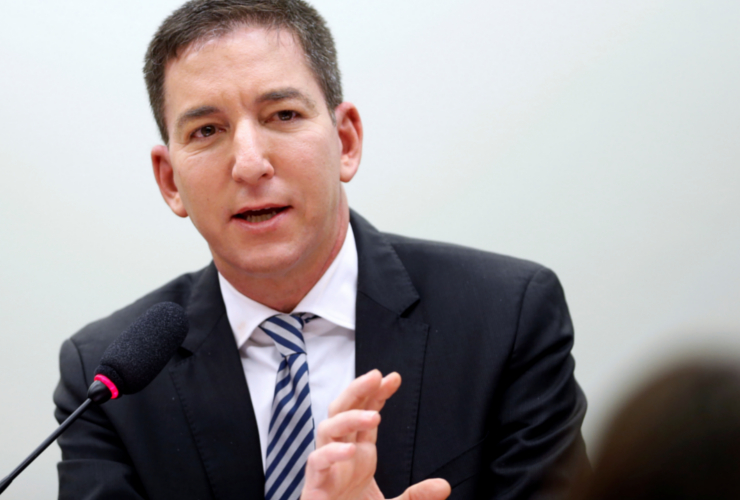The International Press Institute (IPI), the global network of editors, media executives and leading journalists for press freedom, has joined nearly four dozen other press freedom and civil liberties organizations in an open letter condemning Brazil’s decision to charge U.S. journalist Glenn Greenwald in response to his reporting with The Intercept Brasil.
IPI separately called on Brazil to drop the charges earlier this week, calling them a “blatant violation of press freedom and democratic norms”.
Read the full letter below.
Open Letter to Brazilian Authorities on the Charges Against Journalist Glenn Greenwald
Presidente da República, Jair Bolsonaro
Presidente da Câmara dos Deputados, Rodrigo Felinto Ibarra Epitácio Maia
Presidente do Senado, David Samuel Alcolumbre Tobelem
Presidente do Supremo Tribunal Federal, José Antonio Dias Toffoli
Procurador Geral da República, Antônio Augusto Brandão de Aras
Corregedora Geral do Ministério Público Federal, Elizeta Maria de Paiva Ramos
Procuradora Federal dos Direitos dos Cidadãos, Deborah Macedo Duprat de Britto Pereira
We, the undersigned press freedom and civil liberties organizations, emphatically condemn the Brazilian authorities’ criminal charges against the award-winning investigative journalist Glenn Greenwald.
These charges represent a straightforward attempt to intimidate and retaliate against Greenwald and The Intercept Brasil for their critical reporting on messages that appeared to show a judge advising federal prosecutors how to prosecute cases he was presiding over in the “Operation Car Wash” investigation. Further, by charging Greenwald with a cybercrime the government has essentially criminalized engaging in legitimate journalistic practices, which threatens to have a chilling effect on journalists and sources alike.
The recently disclosed charges are only the most recent development in a campaign of harassment against journalists covering the scandal. Threats against them have been documented since last June, when The Intercept Brasil began publishing a series of important public interest stories based on a cache of leaked Telegram messages between public officials.
A coalition of 29 free speech and human rights organizations penned a letter in July 2019 to denounce these threats. Then, as now, the implications affect not just Greenwald and his colleagues, but the broader free press in Brazil, including both domestic and international media.
The attacks on Greenwald and The Intercept Brasil have included specific death threats, public disinformation, and a criminal prosecution. Notably, in August 2019, in a remarkable opinion by a member of Brazil’s highest court ordered any police investigation into Greenwald halted and condemned any such efforts as “an unambiguous act of censorship” in violation of the country’s constitution.
The right of journalists to report on primary source materials documenting official malfeasance is a critically important press freedom issue. The Federal Prosecutor’s Office has abused its power by charging Greenwald for doing just that — despite a federal police conclusion just last month that there was no evidence that Greenwald committed any crime in relation to the leaked messages.
Given the Supreme Court injunction and that federal police conclusion, the Federal Prosecutor’s Office’s position that Greenwald conspired to commit a crime with his anonymous source is unjustifiable.
These charges await approval from a federal judge, giving the courts the opportunity to reject them and protect freedom of the press. Even so, the chilling effect of such legal intimidation remains. If these tactics are allowed to stand, it would jeopardize all Brazilians’ freedom of speech, freedom of the press, and freedom to participate in democracy.
Freedom of the Press Foundation*
Reporters Without Borders
Access Now
Agência Pública
American Civil Liberties Union
ARTICLE 19 Brazil and South America
Asociación por los Derechos Civiles
Association for Progressive Communications
(APC)
Brave New Films
Brazilian Association of Investigative Journalism
(Abraji)
CODEPINK
Columbia Journalism Review
Committee to Protect Journalists
Cooperativa Tierra Común
Demand Progress
Derechos Digitales
Doc Society
Electronic Frontier Foundation (EFF)
ExposeFacts
Fundación Acceso (Costa Rica)
Fundación Ciudadania Inteligente
Fundación Datos Protegidos (Chile)
Fundación Karisma
Fundación Huaira (Ecuador)
Fundación Vía Libre
Human Rights Watch
IFEX
IFEX-ALC
IPANDETEC Centroamérica
Instituto Vladimir Herzog
International Press Institute
Intervozes
National Federation of Brazilian Journalists
(FENAJ)
Newscoop
Pen International
Reporters Committee for Freedom of the Press
Roots Action
Sursiendo CCD
TEDIC
Ubunteam Community
Usuarios Digitales
World Association of News Publishers
Witness
